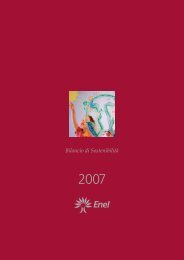Annual Report 2010 - Enel.com
Annual Report 2010 - Enel.com
Annual Report 2010 - Enel.com
Create successful ePaper yourself
Turn your PDF publications into a flip-book with our unique Google optimized e-Paper software.
veto to the adoption of resolutions liable to have a major<br />
impact on the Company (by which is understood<br />
resolutions to wind-up, transfer, merge, or split-up<br />
the Company or to move its headquarters abroad or<br />
change its corporate purpose, as well as those aimed<br />
at abolishing or changing the content of the “special<br />
powers”). Grounds for the veto must in any case be given<br />
and the veto may be exercised only in cases in which<br />
such resolutions are liable to cause concrete detriment<br />
to vital national interests;<br />
> appointment of a Director without the right to vote<br />
(and of the related substitute in case he or she leaves<br />
the office).<br />
It should be noted that, on March 26, 2009, the Court of<br />
Justice of the European Communities declared that, by<br />
adopting the provisions stated in Article 1, paragraph<br />
2, of the aforesaid Prime Minister’s Decree of June 10,<br />
2004 containing the criteria for exercising the special<br />
powers, Italy failed to meet its obligations under Articles<br />
43 (freedom of establishment) and 56 (free circulation<br />
of capital) of the institutive Treaty of the European<br />
Community.<br />
Thereafter, Decree of the President of the Council of<br />
Ministers dated May 20, <strong>2010</strong> abrogated the provision<br />
of the aforesaid Prime Minister’s Decree of June 10, 2004<br />
censured by the Court of Justice of the European Communities,<br />
which contained the circumstances in which<br />
the special powers provided under letters a), b) and c)<br />
could be effectively exercised. Article 1, paragraph 1, of<br />
the Prime Minister’s Decree of June 10, 2004, according<br />
to which the “special powers” may be exercised “only in<br />
the event of relevant and unavoidable reasons of general<br />
interest, with particular reference to public order, security,<br />
health and defense, in the form and through means which<br />
are suitable and proportional to safeguard such interests,<br />
also through the possible provision of appropriate time<br />
constraints, without prejudice to national and EU rules,<br />
and among those, in first instance, the non-discrimination<br />
principle“, remains applicable.<br />
248 <strong>Enel</strong> <strong>Annual</strong> <strong>Report</strong> <strong>2010</strong><br />
Corporate governance<br />
Employee shareholdings:<br />
mechanism for exercising voting<br />
rights<br />
The Unified Financial Act sets forth specific rules regarding<br />
voting proxies in listed <strong>com</strong>panies, which deviate – for<br />
such <strong>com</strong>panies – from the provisions set forth in the Civil<br />
Code and which were significantly amended following<br />
the implementation in Italy of Directive 2007/36/EC (relating<br />
to the exercise of certain rights of the shareholders<br />
of listed <strong>com</strong>panies) by Legislative Decree 27 of January<br />
27, <strong>2010</strong>. The foregoing specific rules govern the solicitation<br />
of proxies, which is defined as the request for proxies<br />
addressed to more than two-hundred shareholders,<br />
on specific voting proposals, or ac<strong>com</strong>panied by re<strong>com</strong>mendations,<br />
declarations and other indications suitable<br />
for the purpose of influencing the vote. However, the<br />
Unified Financial Act clarifies that the request for proxies<br />
ac<strong>com</strong>panied by re<strong>com</strong>mendations, declarations and<br />
other indication suitable for the purpose of influencing<br />
the vote, which is addressed by associations of shareholders<br />
to their affiliates – including those associations which<br />
put together employees who are shareholders – is not to<br />
be considered as solicitation of proxies – and, thus, is not<br />
subject to the relevant specific discipline – if such associations<br />
<strong>com</strong>ply with the specific requirements set forth by<br />
the Unified Financial Act.<br />
At the same time, the Unified Financial Act continues to<br />
hope for the bylaws of listed <strong>com</strong>panies to contain provisions<br />
aimed at simplifying the exercise of voting right<br />
through proxy by the employees who are shareholders,<br />
thus fostering their participation to the decision of the<br />
shareholders’ meetings.<br />
In such respect, since 1999, <strong>Enel</strong>’s bylaws expressly provide<br />
that, in order to simplify the collection of proxies by<br />
the employees-shareholders of the Company and of its<br />
subsidiaries, which are affiliated to associations of shareholders<br />
which <strong>com</strong>ply with the requirements prescribed<br />
by applicable laws, facilities for <strong>com</strong>munication and for<br />
the collection of proxies shall be made available to such<br />
associations, pursuant to the terms and modalities to be<br />
agreed upon from time to time with their legal representatives.<br />
In March 2008 the establishment of an employee-shareholders’<br />
association called ADIGE - Associazione Azionisti<br />
Dipendenti Gruppo <strong>Enel</strong> (Association of Employee-Shareholders<br />
of <strong>Enel</strong> Group) which possesses the requirements









